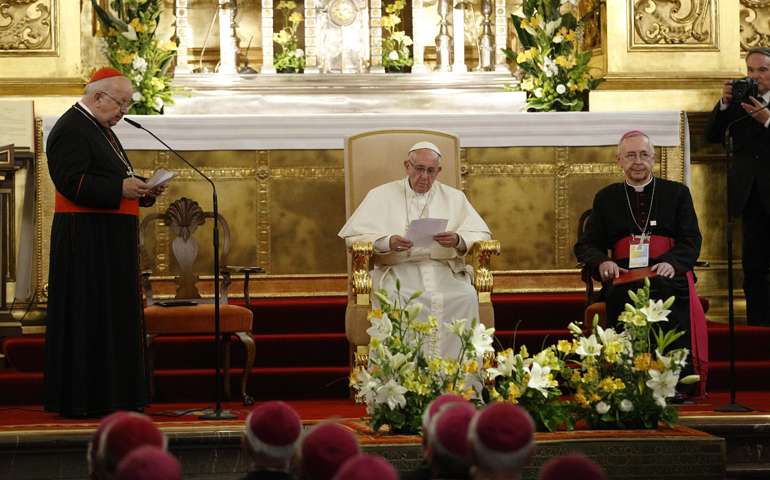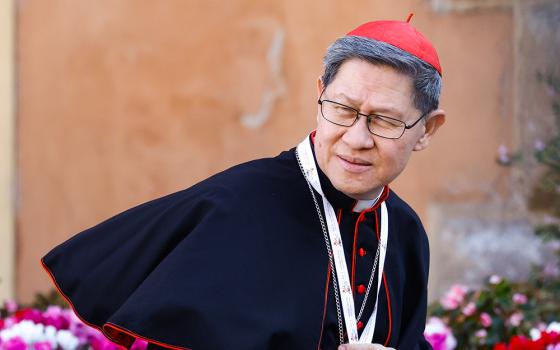
Pope Francis listens as Cardinal Stanislaw Dziwisz of Krakow, Poland, speaks during a meeting with Poland's bishops at the cathedral in Krakow, Poland, July 27. At right is Archbishop Stanislaw Gadecki, president of the Polish bishops conference. (CNS/Paul Haring)
Pope Francis warned Poland's Catholic bishops that an increasingly secularized and de-Christianized culture leaves people orphaned, being vaguely spiritual without Christ or his church.
Speaking July 27 with the 117-member bishops' conference in the Krakow cathedral, the pope also said that behind the exploitation of people and creation "ideological colonization" is at work and is seen, for instance, in the promotion of "gender theory" -- the idea that people choose to be male or female -- which seeks to "annihilate humankind as the image of God."
Six days after the pope met the bishops privately, the Vatican released the transcript of the question-and-answer portion of the 90-minute meeting. The highly anticipated meeting came at time of reported disagreements within the Polish church over certain aspects of the pope's teaching, including his appeals for sheltering refugees.
Pope Francis answered questions from four bishops, the first from Archbishop Marek Jedraszewski of Lodz who asked the pope what pastoral action the Polish church can take to defend the country's Catholics from an increasingly "atheist-liberal contemporary culture."
The pope agreed with the archbishop's assessment of today's culture and said that even where there are signs of spiritual thirst, it often is part of a "subjective spirituality without Christ." The church's response, he said, must be to be out among the people, close to them and willing to "waste time" with them.
He recalled a person who was hesitant to go to confession because he was in a situation in which he could not receive absolution. Instead, the parish priest listened to him, blessed him and made him promise to come back.
Even though he could not offer absolution, "this priest 'wasted time' in order to draw this man toward the sacraments. This is called closeness," the pope said.
Bishops, he continued, must also be close to their priests and readily available for them so that they "may feel that they have a father."
Pope Francis also stressed that bishops must exercise patience when reaching out to young people who find themselves "bored." He cited the example of St. John Paul II, who would teach university students and then would go with them on outings.
"He would teach them at school, but then he would go with them to the mountains. (This is) closeness. He would listen to them, he was with the young people," the pope said.
Answering a question from Auxiliary Bishop Leszek Leszkiewicz of Tarnow on whether parishes are still the best way to reach people and on how to build up missionary zeal, Pope Francis stressed that the parish "is the house of the people of God" and must have its doors wide open to receive people.
"There are parishes with parish secretaries who seem to be 'disciples of Satan' and scare people; parishes with closed doors," he said.
Instead, members of parishes must take up the mantle of "missionary disciples" and reach out to those far away. "I think about the people in my homeland: if you do not go out looking for them, if you don't try to be close to them, they won't come," he said.
Auxiliary Bishop Krzysztof Zadarko of Koszalin-Kolobrzeg asked the pope not only how to help the large number of refugees coming into Europe, but how to overcome "the fear of a possible invasion or aggression that has paralyzed society."
Pope Francis said all countries are different and that a universal response can't be given because "it depends on the situation of every country and culture." However, what must remain absolute is the need "to have an open heart ready to receive" those escaping violence and persecution. "This is absolute!"
The pope highlighted the need to place the issue of refugees in its proper "context," adding that the spread of ideologies has contributed to the wars and exploitation that cause people to flee as well as to the confusion many people feel in trying to resolve the problem.
"It is a global problem: the exploitation of creation and the exploitation of people. We are living at a time when humankind as the image of God is being annihilated," he said.
Pope Francis told the bishops of a conversation he had with retired Pope Benedict XVI who told him, "Your Holiness, we are living in an age of sin against God the Creator."
Among those sins, the pope continued, is ideological colonization, and particularly that of gender theory, which argues that male and female characteristics are not biologically determined but are malleable social constructs.
"Today, children are taught this at school: that everyone can choose their own sex. And why do they teach this? Because the books come from those people and institutions who give money," he said.
"God created man and woman; God created the world like this and we are doing the exact opposite," the pope said.





